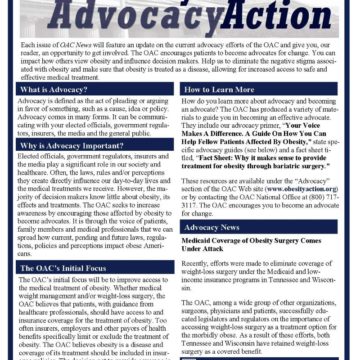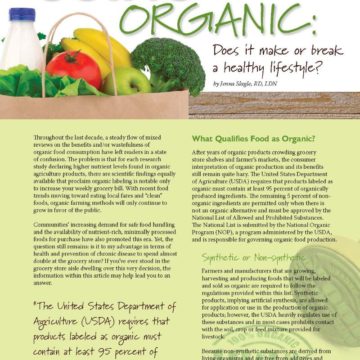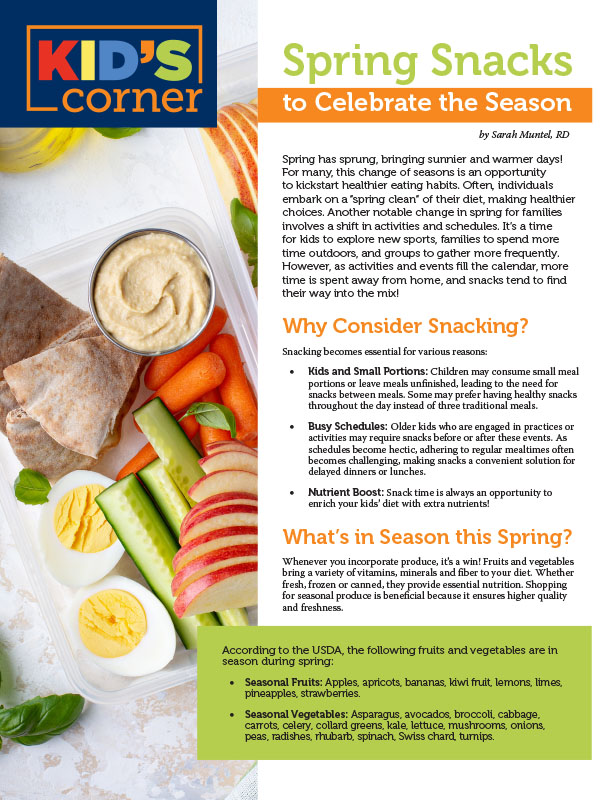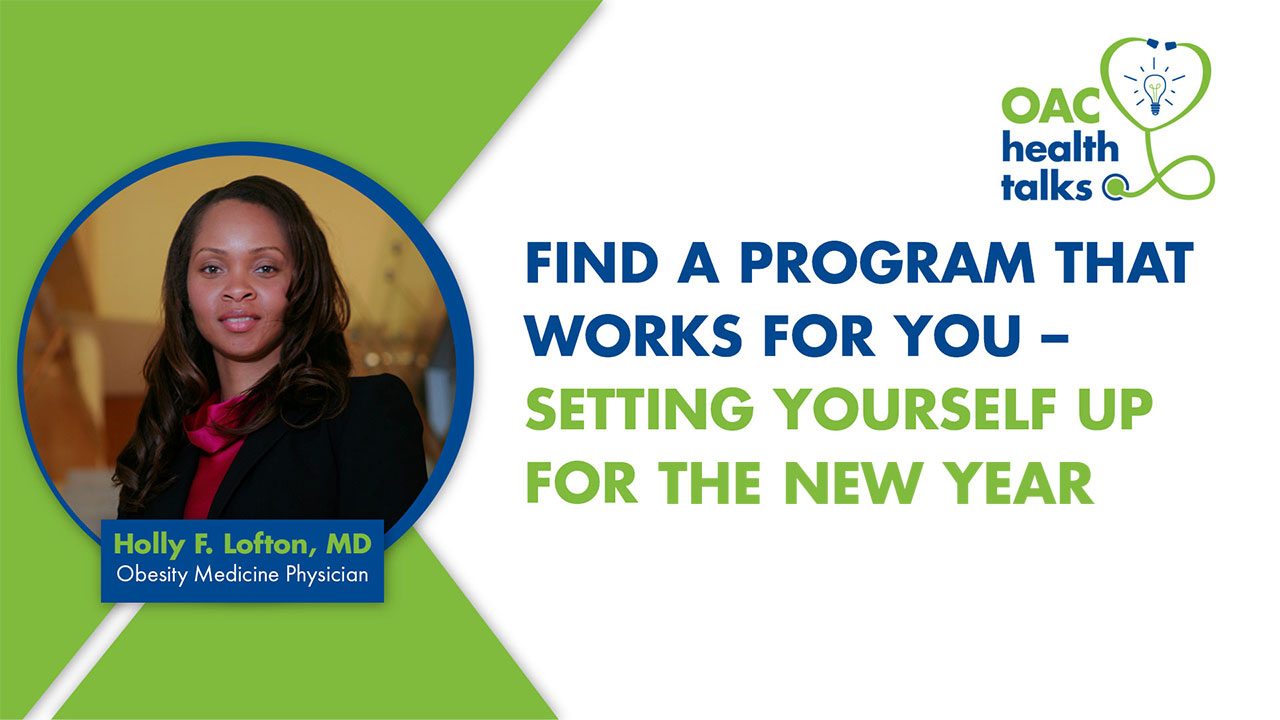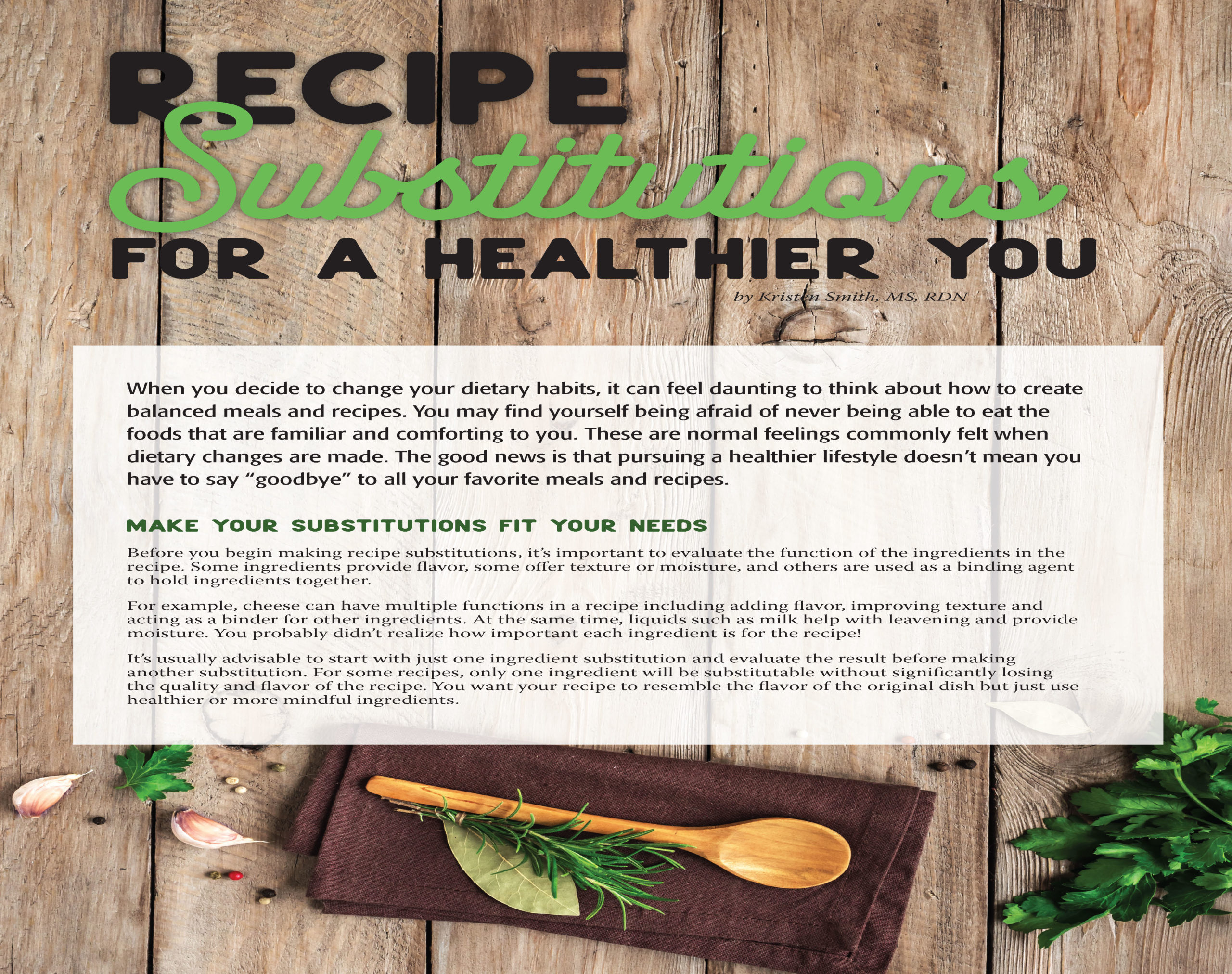Artificially Sweetened Beverages– Friend or Foe? You be the judge.

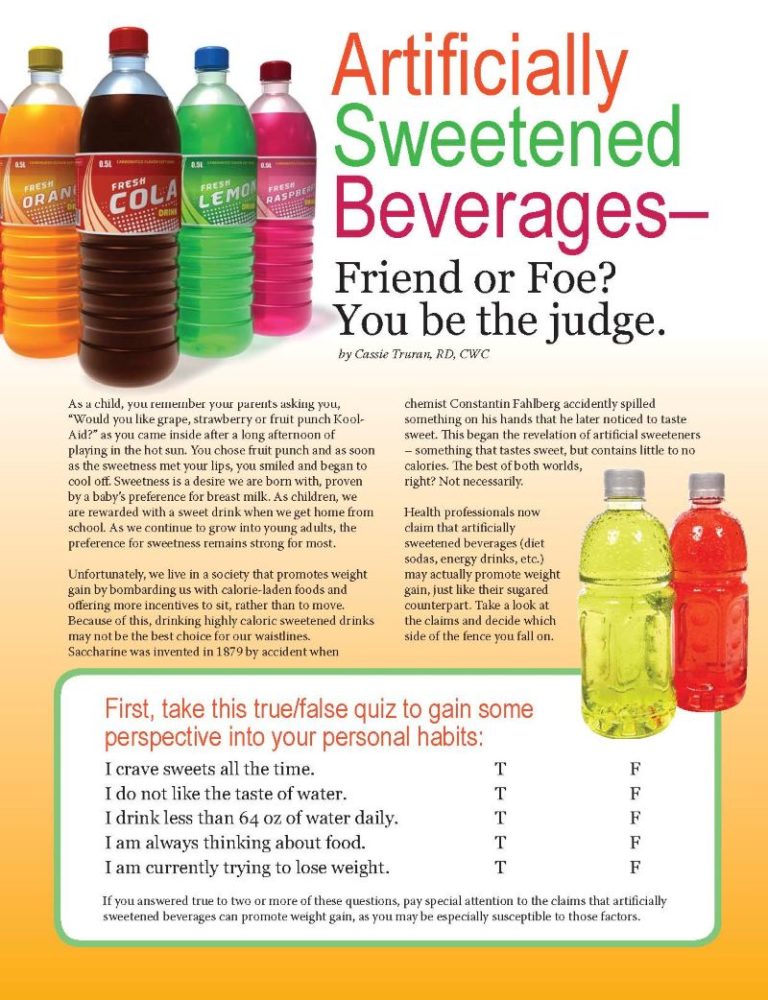
by Cassie Truran, RD, CWC
Fall 2011
As a child, you remember your parents asking you, “Would you like grape, strawberry or fruit punch Kool-Aid?” as you came inside after a long afternoon of playing in the hot sun. You chose fruit punch and as soon as the sweetness met your lips, you smiled and began to cool off. Sweetness is a desire we are born with, proven by a baby’s preference for breast milk. As children, we are rewarded with a sweet drink when we get home from school. As we continue to grow into young adults, the preference for sweetness remains strong for most.
Unfortunately, we live in a society that promotes weight gain by bombarding us with calorie-laden foods and offering more incentives to sit, rather than to move. Because of this, drinking highly caloric sweetened drinks may not be the best choice for our waistlines.
First, take this true/false quiz to gain some perspective into your personal habits:
I crave sweets all the time. T F
I do not like the taste of water. T F
I drink less than 64 oz of water daily. T F
I am always thinking about food. T F
I am currently trying to lose weight. T F
If you answered true to two or more of these questions, pay special attention to the claims that artificially sweetened beverages can promote weight gain, as you may be especially susceptible to those factors.
Saccharine was invented in 1879 by accident when chemist Constantin Fahlberg accidently spilled something on his hands that he later noticed to taste sweet. This began the revelation of artificial sweeteners – something that tastes sweet, but contains little to no calories. The best of both worlds, right? Not necessarily.
Health professionals now claim that artificially sweetened beverages (diet sodas, energy drinks, etc.) may actually promote weight gain, just like their sugared counterpart. Take a look at the claims and decide which side of the fence you fall on.
Friend
- Replaces high caloric drinks:
Americans consume approximately 25 percent of their daily calories from beverages. For most people, this would mean that they drink 450-625 calories each day. Therefore, if you replace all caloric-containing beverages with beverages that provide no calories, you would decrease your total calorie intake for the day. - Provides a sweet taste with little-to-no calories:
Some people find that enjoying a no/low calorie sweetened beverage at the end of the day is a relaxing way to enjoy a sweet flavor without an enormous load of calories. Instead of eating ice cream while watching television, they will sip on an artificially sweetened beverage. - Increases fluid consumption for people who don’t like water:
For people who have had weight-loss surgery, especially those who have recently had surgery, consuming adequate fluids is essential. Due to the rapid amount of weight lost in the immediate months after surgery, patients are at a high risk for dehydration. Some patients find that adding a small amount of an artificially sweetened beverage to their water helps increase the amount of fluid they consume, therefore, preventing dehydration.
Foe
- Constant sweet flavor drives cravings for sweets:
Drinking these beverages frequently can drive the desire to have something sweet. If you are someone who “craves” sweets all day, you may benefit from a “sweet detox.” This means you take one week away from all sweets/treats. Try eating whole foods only. If it doesn’t grow from the ground, swim in the ground or walk on the ground, don’t eat it. Drink plain water only or tea without any sweetener (artificial or sugar). Our taste buds and desire to eat certain foods can be reset fairly quickly and often times a “sweet detox” can help decrease those sweet cravings. - “Numbs” taste buds decreasing flavor from healthy foods:
Artificial sweeteners are 100-400 times sweeter than sucrose (table sugar). By constantly bombarding our taste buds with this intense sweetness, healthy foods begin to taste bland, and high fat/high salt foods can end up winning the meal choice. - Theory – drinking artificially sweetened beverages can cause you to eat more:
An interesting study conducted on rodents showed those fed saccharin (an artificial sweetener) actually gained weight compared to those fed sugar. Scientists speculate that because you are taking in something with a sweet flavor without any calories, there is a disconnect between your brain and your body. The theory is that your brain will then set you up to seek out the calories that it didn’t find in that sweetened beverage, therefore, eating more calories throughout the day.
Conclusion
Now that we’ve evaluated some of the claims on artificially sweetened beverages, think about your own personal preferences for sweets and healthy foods. Our lives change frequently and there is no “right” answer to how artificially sweetened beverages affect you. Weight-loss and maintenance of a healthy weight always comes down to calories in versus calories out. Therefore, reaching for a sugar-laden drink, loaded with calories, isn’t always a wise choice; however, assuming an artificially sweetened drink is safe is not always accurate either. As is true with all things, enjoy in moderation!
Of course, the ideal beverage is readily available, cheap and considered Mother Nature’s health drink. You guessed it…water! However, when the time comes when water just isn’t cutting it and you need a little variety, try flavoring naturally. Lemons, limes, oranges, raspberries, cucumbers and mint all add a nice flavor to water. Keeping it simple by using natural ingredients will actually get you the best of both worlds; a little variety, but with natural ingredients that your body knows how to break down and digest.
About the Author:
Cassie Truran, RD, CWC, has worked as a dietitian and wellness coach at Scottsdale Healthcare Bariatric Center for more than six years counseling both surgical and non-surgical weight-loss patients and serves on the ASMBS Integrated Health Professional Education Committee.
Energy Drinks- Healthy or Not Healthy?
by Rachel Brown RD, LDN
It is after lunch, mid-afternoon on a Monday; we have all been there. You are seriously dragging in your energy level and all you want to do is take an afternoon siesta. You need some energy and you need it quick. Many of us will head straight to the vending machine or cafeteria to buy a shiny, promising hope of energy in a can; the energy drink. Is this the best choice?
Americans spend millions of dollars each year on energy drinks. That says two things; we as Americans are lacking energy and are really thirsty! Before we get into the nitty gritty of energy drinks, it is important to realize that the effects of the added nutrients promoted on energy drink cans have not been studied long-term. Taurine, guarana and B-Vitamins are some popular examples. These added supplements are not standardized in manufacturing, so there is no way to know that what it says on the bottle is the same form of that vitamin you can buy at your local vitamin store.
These factors could lead to unknown food/drug interactions or side effects. Most of the bells and whistles added into energy drinks to entice consumers to buy, can easily and naturally be obtained through a well-balanced diet.
Let’s Take a Deeper Look
TAURINE: Taurine is a common dietary supplement found naturally in meat, dairy and fish that is thought to have antioxidant properties. Some studies propose that taurine may improve athletic performance, which may describe why taurine is the current trend in energy drinks. Taurine is an amino acid that supports the nervous system and helps regulate the level of water and mineral salts in our blood. Researchers have found that caffeine and taurine can raise blood pressure and affect cardiac function. There is little known about the effects of the long-term use of taurine, so moderation is important.
CAFFEINE: Safe levels of caffeine are considered to be 0-300 milligrams a day, equal to about two to four cups of coffee. Keep in mind that many things have caffeine, some of which you may not have thought about, including chocolate and medications, such as Excedrin. Too much caffeine can lead to irritability, nervousness, high blood pressure, insomnia and an increased heart rate. Some energy drinks have as much caffeine as 15 cans of soda! Caffeine promotes dehydration so it is not a good choice to use for hydration before or after exercise.
SUGAR: Drinking your calories is never a good idea and is the quickest way to pack on excess weight with ease. After that third energy drink of the day, you can easily have added more than 800 calories to your daily caloric intake from your drinks alone! Remember that 3,500 calories equals a pound. Adding a calorie-dense, sugar-packed beverage does not help our bulging waistlines.
B-Vitamins: B-Vitamins are not original to energy drinks. These vitamins help the process your body uses to get or make energy from the food you eat and help form red blood cells. You can acquire B vitamins from proteins such as fish, poultry, meat, eggs and dairy products, leafy green vegetables, beans, peas, fortified cereals and some breads. B1 thiamine, B3 niacin, B5 pantothenic acid, B6, B7 biotin, B12 and folic acid are in the group pinned as B-Vitamins.
Let’s Look at the Facts:
Full Throttle Energy Drink (Citrus Flavor)
– 16 fluid oz/Calories: 220/Carbs: 58gm/Caffeine: 144 mg
Rockstar Energy Drink
– 16 fluid oz/Calories: 290/Carbs: 68gm/Caffeine: 160mg
RedBull Energy Drink
– 8.4 fluid oz/Calories: 110/Carbs: 28gm/Caffeine: 80mg
Starbucks Double Shot Energy and Coffee Drink
– 15 fluid oz/Calories: 220/Carbs: 36gm/Caffeine: 146mg
Water
– 0 Calories/0 Carbs
Water with Mio Water Enhancer Squirt
– 0 calories/ 0 carbs
Conclusion
Let’s face it; most of us don’t drink just one of anything these days. Portion control is one of the biggest issues today, helping to lead our nation into obesity. Moderation, meaning maybe one every now and then, can be a part of a healthy diet. These are not everyday drinks and children, especially, should not be consuming these. Some have more than one a day which could easily lead to dependency and addiction. It has been said that as little as 100mg of caffeine can lead to addiction.
Energy drinks are packed with chemicals and flaunt the promise of energy now! We buy, consume and quickly crash. We then feel worse than we did before we wasted three dollars to feel jittery, anxious and agitated. Was it worth it?
About the Author:
Rachel Brown RD, LDN, is a registered dietitian at the Centennial Center for the Treatment of Obesity in Nashville, Tenn. She helps counsel weight-loss surgery patients, pre and post-op, on their journey to healthier lives.
by Sarah Muntel, RD Spring 2024 Spring has sprung, bringing sunnier and warmer days! For many, this…
Read ArticleWith the holidays behind us and 2022 now here, many of us are ready to tackle our…
View Videoby Kristen Smith, MS, RDN Winter 2022 When you decide to change your dietary habits, it can…
Read Article




